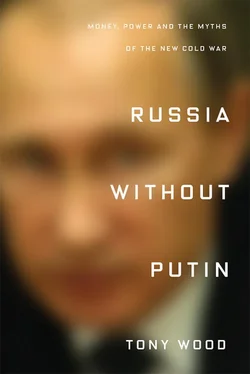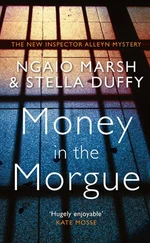The intelligentsia, for its part, underwent a twofold unmaking in the 1990s. The state institutions and structures that had materially sustained it were dissolving, and the sense of collective social identity that marked it out as a specific group was dwindling. Downgrading and déclassement were the fate of many, especially of those from the ‘mass intelligentsia’ – engineers, technicians, ‘specialists’ – created by Soviet industrialization.
The transition to capitalism had an especially dramatic effect on the vast scientific and technical apparatus. Basic funding for research in all fields dried up, and in many cases disappeared altogether. Spending on science accounted for only 2 per cent of the government budget in 2000, and the total amount was around one-thirtieth of what it had been in 1990. Thousands of academics and technical personnel were thrown into unemployment, or continued their work on minimal or non-existent resources. Many others emigrated: according to one rough estimate, some 8,000 top-level mathematicians and physicists left the country between 1990 and 1999. {32} 32 Shkaratan, ‘Sotsial’noe rassloenie v sovremennoi Rossii’, p. 31.
The experience of that decade showed that scientific and technical foundations built over generations can be eroded with dramatic speed. Having helped to turn an agrarian empire into a global superpower – complete with nuclear arsenal, space programme, advances in astrophysics and cybernetics – Russia’s scientists found themselves marking time amid its ruins.
The cultural sphere is often better able to function on meagre means, and to spring back from crisis quickly. Even here, though, the impact of ‘transition’ was far-reaching: the withdrawal of state funding did away with thousands of jobs and an entire ecosystem of publishing. Some of the old journals and magazines staggered on, and a motley array of new ones emerged. But the advent of the market meant the disappearance of many of the networks and channels through which cultural products had been diffused.
Institutional atrophy and slumping economic fortunes helped bring on a splintering of the intelligentsia’s collective sense of self. In 1993, the sociologists Lev Gudkov and Boris Dubin argued that the very idea of ‘a shared intelligentsia sentiment, lending rhythm to the existence of the whole social layer’, had already vanished. {33} 33 Lev Gudkov and Boris Dubin, ‘Bez napriazheniia’ (1993), in Intelligentsiia: Zametki o literaturno-politicheskikh illiuziiakh [1995], 2nd ed., St Petersburg 2009, pp. 152–53.
What was taking place now was a ‘powerful process of professional differentiation’, as the former intelligentsia was separated out into various roles thrown up by the new market order. The 1990s boom in petty trade generated a host of low-skilled, badly paid, loosely ‘cultural’ jobs in advertising and sales. ‘Professionalization’ was also in large measure a process of deskilling and proletarianization, only partially masked by the glossy patina of the new consumerism.
At the same time, a more profound shift was under way, marking a historic break with the intelligentsia’s social purpose and political orientation. Among much of the cultural and artistic elite, a long-standing identification with the people – always laced with ambiguities, to be sure – gave way to an embrace of the market forces riding roughshod over them. The bulk of the country’s intellectual elite were prominent supporters first of Gorbachev’s perestroika and then of Yeltsin. Many of the key personnel implementing the 1990s reforms – Yegor Gaidar, Chubais and others – were drawn from cultural and academic circles. In their eyes, the demolition of the Soviet system was essential to Russia’s advance toward ‘civilization’, and they vociferously backed ‘shock therapy’ and the free-market reforms against any and all opposition: it was Yeltsin or the abyss.
A crucial moment came in 1993, during the president’s standoff with the Supreme Soviet. The day after the shelling of the parliament building, an open letter appeared in Izvestiia , signed by forty-two writers, stating that ‘these dumb bastards respect only force’, and urging the government to take further ‘decisive measures’, including the banning of Communist and nationalist parties and the closure of their newspapers. {34} 34 Thanks to Irina Sandomirskaia for alerting me to this document.
Barely a year later, many of the same intellectuals took a principled stand against the bombing of civilians in Grozny; but as the former dissident Andrei Sinyavsky put it, ‘The intelligentsia has not yet understood that the war in Chechnya is a direct continuation of the firing on the White House.’ {35} 35 Andrei Sinyavsky, The Russian Intelligentsia , New York 1997, p. 22.
Behind the intelligentsia’s political failing, according to Sinyavsky, lay a deeper desertion of their historic popular sympathies: ‘The intelligentsia, which in the past had lived with the people and shared its misfortunes to such an extent that the very term “intellectual”… unequivocally implied a love for the people, was today afraid of those same people.’ {36} 36 Sinyavsky, Russian Intelligentsia , pp. 12–13.
In some cases, that fear was overpowered by contempt: in January 1999, shortly after the rouble crisis, novelist and critic Viktor Erofeev disparaged the mass of the Russian population as ‘medieval creatures’ who were ‘dragging Russia down toward the bottom’:
However one relates to it, this mass has, by the will of chance, been turned into an electorate; it has a vote, but has nothing in common with democracy. What is to be done with it? Deceive it? Wash it? Re-educate it? Wait for it to die? The last option is illusory: old people trail grandchildren, great-grandchildren behind them who will also stand on all fours… Only one thing remains: to put them in a concentration camp. But they are in any case already there. {37} 37 Viktor Erofeev, ‘Zhivoe srednevekov’e’, Obshchaia gazeta , 14–20 January 1999; my attention was drawn to this text by Clément, Les ouvriers russes dans la tourmente du marché , p. 212.
Such language was unusual only in its vicious directness; couched in other forms and arguments, the sentiments behind it were widespread.
How completely was the Russian intelligentsia ‘unmade’ in the 1990s – was it in fact slated for total disappearance? In 1994, Gudkov and Dubin concluded mournfully that the intelligentsia as currently constituted was unable to address the country’s situation: ‘Other groups and people, it seems, will resolve the problems that have accumulated – people who have been educated differently, with a different understanding of themselves and the world in which they live.’ {38} 38 Gudkov and Dubin, ‘Ideologiia besstrukturnosti’ (1994), in Intelligentsiia , p. 279.
The philosopher Mikhail Ryklin thought his entire generation had already entered the afterlife, subsisting in a zombie-like state: ‘After the death of the country in which we were born, we have already become dead people, and so the death that awaits us will not be the first.’ {39} 39 Mikhail Ryklin, ‘Medium i avtor: O tekstakh Vladimira Sorokina’, afterword to Vladimir Sorokin, Sobranie sochinenii v dvukh tomakh , vol. 2, Moscow 1998, p. 744.
Yet neither these otherworldly metaphors nor the dislocation that had inspired them were unprecedented – as the title of Masha Gessen’s 1997 book on the Russian intelligentsia, Dead Again , wryly attests. Epochal crises had several times threatened the intelligentsia with destruction – the Revolution, Civil War, Stalinist purges and the Second World War – before Brezhnevism all but bored it to death. Each time there had then been a rebirth or refoundation, in a novel form and changed atmosphere. Would it not emerge yet again, blinking, into the new century?
Читать дальше












